Moscow Spring
MOSCOW
MAY 25
For five months, I had regretted my decision to avoid airplanes. Now, as I disembarked from the Tashkent-Moscow flight, I remembered that planes were
dehumanizing and manic. Around me, people scrambled and lost their tempers. One
woman pushed past me in line at Customs, glaring when I pushed back. It took an
hour to move twenty feet to the yellow line at Passport Control.
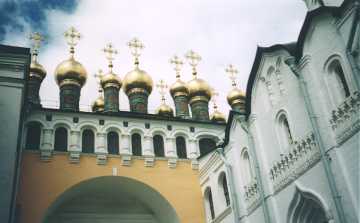 Kremlin
Kremlin
Still, it was better than facing down border guards and train conductors
for four days. It beat sleeping two feet from a man who had just demanded sex
(see "The Trans-Siberian Hellway"). I did feel foolish, though. If I hadn't
taken that fateful left turn into Central Asia, if I'd just gone from
Siberia to Moscow, I wouldn't have had to fly. But I would've missed all that
Uzbek fun (see "Tashkent Shakedown").
Helen from Passport Travel had arranged for G&R International to pick me up and transfer me to my homestay. The agent waited with his wife. Both were dressed for a night on the town. I'd probably interrupted their Saturday night, not to mention forced them to spend an hour standing outside Customs with a "JAVINS" sign.
Mr. and Mrs. G&R drove me about twenty minutes to a small apartment
block. They gave me a remarkably thorough pile of paperwork, which included not
only my train ticket to St. Petersburg but also a detailed schematic explaining
the various codes on the ticket. "I could've used that in Almaty," I thought.
Moscow was freezing, and I was dressed for the blistering heat of
Uzbekistan. Fortunately, the walk from the car to the apartment was short. From
what I could gather, IŽd be staying with a single mom and two kids.
Lena was the mom, a pretty, blond, unemployed engineer in her early
forties. She put me in a kid's room, showed me the facilities and went to bed.
The toilet was separate from the sink and bathtub. This had been common
since Ulaan Bataar. My New York apartment, an 1896 tenement on what had once
been immigrant-filled "Ragpicker's Row," had featured separate
facilities before I'd renovated it. Quite a sensible approach to group living, I thought, but there should also be a sink in with the toilet.
The rest of the apartment was spartan, old, and small, but comfortable.
Lena was a tidy housekeeper, and like most Russians, made do with what was
available.
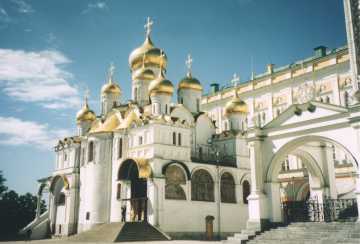 Kremlin
Kremlin
I sat in bed, listening to giggles coming from Lena's room. She'd
moved the kids in with her for the night, and they seemed to be having a
slumber party next door. The kids must be young, I thought. No older kid would be so happy to have a slumber party with mom.
Outside, it was cold. I could hear the wind, but couldn't feel it
through the double-windows. Presumably all Moscow apartment windows were
double-hung. They'd have to be. It was almost June -- and still freezing.
MAY 26
Lena had a breakfast of yogurt and oatmeal waiting for me at eight. She
didn't speak English, and my Russian was limited to simple phrases and "crazy
chicken." Nevertheless, we communicated effectively with the aid of a Russian
dictionary.
She showed me a map of Moscow, and recommended some sights. She asked
what time I'd be home for dinner, and I managed to tell her not to bother. I'd
stay in town, as I was determined to make the most of my time in Moscow.
Finally, the kids rolled out of bed.
There was a shy, blond boy of about ten -- I never learned his name and
only saw him twice. The other was Masha, a sassy 16-year-old smoker. Masha said
she was tired -- she'd worked in a shop until late the night before -- but I
suspected she was tired from giggling all night with mum.
Masha and Lena showed me a hand-drawn map to the metro, and explained --
via drawings and the dictionary -- that the nearest metro closed at night. I'd
have to get off the train a stop earlier and catch a streetcar back.
I left, pleased with my sweet Russian family. Somehow, all their
instructions stuck and I found the metro to town.
First, I did train reconnaissance. I located the "left luggage" counter
at Leningrad Station, and worked out tomorrow's metro route. My pack was too
heavy to wander around making mistakes. Then, I headed to town, on the insane
Moscow metro. Guidebooks sing the praises of the efficient Moscow metro. Don't believe them. The Moscow metro has one fatal flaw that renders it absurd and complex. It is not that the signs are written in Cyrillic, or that the words are Russian. It is easy enough to memorize sounds and shapes of letters and I did so now. But the infrastructure! What genius, I wondered, gave two to four different names to each interchange?
In other words, if you got off the train at one stop, you might walk ten
feet and transfer to another train at a stop with a totally different name. You
could, for example, get on at "Istanbul Street," and then find yourself at
"Constantinople Street" instead. Pardon my politically incorrect judging of a
system of another culture, but that is ridiculous.
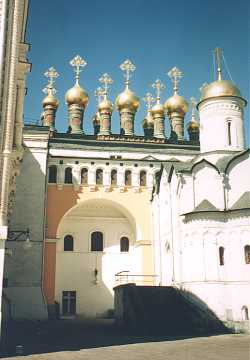 Kremlin
Kremlin
The outlying stops were as grubby as any in New York or London, but in
the center of town, the metro featured chandeliers and stained glass. Each main
station was an attractive individual work of art.
I found my way to the Kremlin, but the long line didn't look appealing
in the cold rain. Instead I made my way to Red Square, opting to avoid Lenin's
Tomb and his waxy corpse. I passed it quickly on my way to St. Basil's
Cathedral.
Red Square didn't actually seem square -- it was more of a
ruddy-colored, brick rectangle. The walls of the secure Kremlin stretched along
one, long side and a posh shopping center along the other. One short end has a
little church, and from the other short end rose St. Basil's, a fantastic curvy
Disney-esque castle straight out of "1001 Arabian Nights."
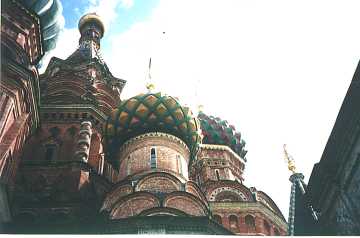 St. Basil's
St. Basil's
There is nothing else quite like St. Basil's in the world, save for a
smaller, similar cathedral in St. Petersburg. The architect combined
elements of Islamic art with western religious building styles. The result is
beyond anything in any cathedral, church, or theme park the world over. If you
were to try to mimic it in the vegetable section of your local supermarket,
you'd take upside down turnips and onions and stick them non-uniformly on top of asparagus, carrots, and beets (it is Russia). You'd then drench it all in finger paints you'd picked up in the school supply aisle. (Disclaimer: MariesWorldTour.com does not endorse or encourage the random destruction of unpurchased vegetables, but still thinks it would be pretty cool.)
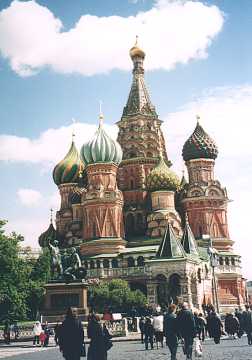 St. Basil's
St. Basil's
Inside, set against fantastic garish gold backgrounds, were colorful
icons -- religious figures painted by devout priests throughout the centuries.
My shoes, the loyal Montrail hiking/sports hybrids I'd picked up in Hong
Kong, had rebelled. The left one in particular had objected to spending
ten days smushed into my stored pack in Tashkent, and it now made its
displeasure clear by rubbing and aggravating my left outside ankle. I limped along and pretended not to notice. It wasn't every day I made it to Moscow, and I had no intention of missing anything.
In search of a sorely-needed Baltics guidebook, I visited an
English-language bookstore. They had every "Lonely Planet" guidebook except the
one I needed, and no other guidebook series. I'd try again in St. Petersburg. I
wandered down Arbat Street, the hip district, dodging caricature artists the
whole time.
It was nice to be back in Russia, where I was a freak for not marrying
at 26, instead of in Central Asia where I was a freak for not marrying at 17. I
found a shopping mall and sat in a coffee shop, both to warm up and to rest my
aching left foot. Nearby, trendy young Russians with no money hung out in the
mall, the same as young Americans with no money did at home. The Russians
watched a sound and light show in the central mall court. I looked too, to see
what could be so fascinating. The show was really low-key, with a few different
spots lighting up when the music changed. The Russians weren't starting in awe
-- they were just staring because they had nothing else to do.
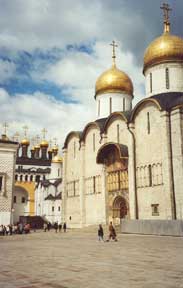 Kremlin
Kremlin
I limped back to the subway, and managed to find my way home to Lena's.
Masha had worked in the shop all day, but Lena and her son had cooked us all a
special treat. They were puffy pastries. I asked what they were.
Masha paged through the dictionary, and eventually found "fruit." This
wasn't very specific, so I asked "apple? Like McDonald's?"
"NOT like McDonald's," said Masha, clearly offended by the comparison.
We ate them, and while they were actually apple pies like at McDonald's,
I could see why she'd been offended. They were light and delicious, baked
instead of deep-fried. I ate two.
I stumbled back into the kitchen later, looking for the shower. Masha
sat there, chain-smoking. Surprised that her mom let her smoke in the house, I
mumbled something like "that isn't good for you," and made my way to the shower
across the hall.
MAY 27
Lena hugged me goodbye, and Masha walked me to the metro. This disturbed
my plan -- I had a small bag of rubbish that I was going to deposit in a nearby
dumpster. Russian homes seem to suffer from a dearth of wastebaskets. Lena's
trashcan had consisted of a yogurt cup on top of the stove, and I had been
stockpiling my own trash for later disposal. I looked longingly at the dumpster
as we passed it, while Masha was distracted by making fun of my heavy pack. She
hugged me goodbye at the corner and I turned right while she went left.
Fortunately, there was another trashcan nearby.
I stored my bag at the train station, and made my way to a coffee shop
to rest my aching foot. I read the English-language "Russia Journal" over Cafe
Americano.
 changing of the Kremlin guard
changing of the Kremlin guard
Russians, it seemed, were concerned over new transit visa regulations in
the U.S. They were also worried about a cooling of relations with the U.S., but
certainly not as worried as China was. And then they laughed at themselves, at
the old days of no-freedom-of-the-press. The paper quoted the old joke that
"Napoleon went to visit a Soviet military parade on Red Square. He was not
impressed by the tanks and missiles that would've made him win at Waterloo. He
was impressed by the newspaper, which, wouldn't have told anyone that he'd lost
at Waterloo."
In other news, someone had the idea to build a highway tunnel under the
Bering Strait, linking North America and Russia. You could then drive through
eight countries, from New York to London (in the summer, anyway). Certainly, it
would've made my trip a lot easier.
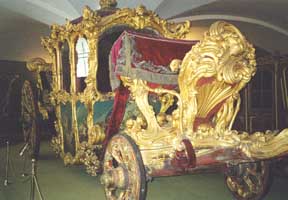 armoury
armoury
My left ankle was swollen, and I needed to do nothing more than sit in
the coffee shop all afternoon. Instead, I had a Kremlin to see, so I gave my
shoe a flat tire and stuck my heel out of the back, into the open air. I limped
to the ticket office.
 Kremlin
Kremlin
The Kremlin is divided into the government section and the tourist
section. Tourists are not allowed into the government section, so the actual
part that I could visit was pretty small. That was all right -- walking was
difficult under the circumstances. I checked out the various grand cathedrals
and churches, and then made my way to the Armoury.
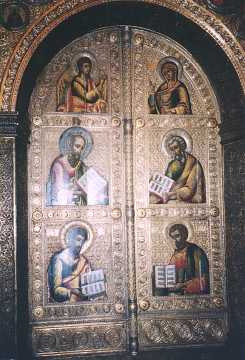 icons
icons
The Armoury houses the State's art collection, including thrones of
tsars', golden carriages that belonged to Catherine the Great, and a number of
Faberge eggs.
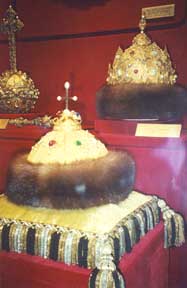 Armoury
Armoury
I have, to be honest, never understood the appeal of a metal egg. It
makes no sense to me -- why are all of these things built into eggs? Chickens
lay eggs, and they have nothing to do with clockworks or gold.
Still, as I saw there looking at the intricate Faberge eggs on display,
it all made sense. I wanted one of my own to take home. There, I thought, I'll
have that one, the golden egg with the miniature gold Trans-Siberian railway
train inside of it. That's the one for me.
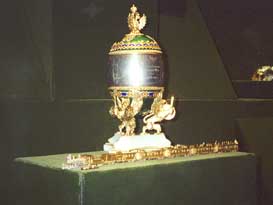 Trans-Siberian huevo
Trans-Siberian huevo
Unfortunately, the Trans-Siberian Egg was not for sale, and even if it
were, the proceeds from my condo sale in Manhattan would doubtless not
even dent the down payment. I sulked away, limping strangely in my flat-tire
shoe, and returned to the coffee shop.
At night, I went in the rain to Leningrad Station. I reclaimed my pack
and went to find the platform. A ticket seller directed me through a door -- it
was a small diner. And there, on the other side, was a door to the platform. I
boarded the train to St. Petersburg. It was filled with upscale Russian
businessmen and women. I slept next to a helpful, well-dressed woman with a
briefcase. It was the best train experience I'd had since Yancey had left me.
NEXT: the Hermitage, a little history lesson, and cold showers in the freezing St. Petersburg hostel.